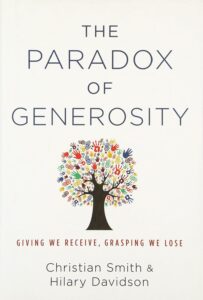What We’re Reading: “The Paradox of Generosity” by Christian Smith & Hilary Davidson
The Paradox of Generosity: Giving We Receive, Grasping We Lose by Christian Smith & Hilary Davidson
How a generosity mindset confers physical, mental, and emotional benefits
 I began at the Knott Foundation, my first foundation job after a career in the nonprofit sector, just a few months ago. When I learned that the Foundation’s blog has a column on what the staff is reading, I wanted to select a book that would explore the idea of philanthropy and giving. I am doing lots of learning on policies, practices, and the way foundations carry out their important work, but what about why we are drawn to philanthropic work? Every day we have the privilege of engaging with people in the nonprofit field giving their time, resources, and mental energy to help others. I picked this book to dig into what generosity means and how it manifests in one’s life in ways big and small.
I began at the Knott Foundation, my first foundation job after a career in the nonprofit sector, just a few months ago. When I learned that the Foundation’s blog has a column on what the staff is reading, I wanted to select a book that would explore the idea of philanthropy and giving. I am doing lots of learning on policies, practices, and the way foundations carry out their important work, but what about why we are drawn to philanthropic work? Every day we have the privilege of engaging with people in the nonprofit field giving their time, resources, and mental energy to help others. I picked this book to dig into what generosity means and how it manifests in one’s life in ways big and small.
This book explores generosity through the results of a 2010 survey and series of interviews that explore the connection between different forms of generosity and greater life benefits like happiness, bodily health, feeling greater life purpose, and interest in personal growth. Here are my key takeaways from the book:
- Generosity as a practice: The book repeatedly returns to the idea that the connection between these human value benefits and generosity is tied to the regular practice of generosity instead of sporadic events. Things like a one-time blood donation or writing a will that gives money to a favorite nonprofit did not yield the same benefits that routine engagement and giving provided. This also applies to things like small, automatic deductions from paychecks or ticking the organ donor box on your driver’s license application.
- Generosity is not just financial: The book shows that the benefits do not just come from giving financially; regular volunteerism, helping friends and family, and devoting attention and emotion to your relationships also benefits your health and well-being. The authors discuss how this regular generosity of time and of your mental energy can pay back your overall happiness and health in the long term.
- Generosity is not as common as you may think: According to the book, over 40% of Americans do not give away a single dollar and another group, also at over 40%, give less than 2% of their annual income. As many other studies have noted, greater income does not translate into giving larger percentages of one’s annual income. Similarly, only 24% of Americans reported volunteering in a given year. The book also shows similar numbers for the other kinds of generosity such as relational and neighborly generosity. This is a little harrowing from the perspective of nonprofit organizations like our grantees who are reliant on donations and volunteer service.
- Generosity as a mindset: The authors point out in numerous ways that the benefits they see from generosity depend most on the mind-set of the giver. Being pressured to give does not result in the same sense of well-being that giving from an inward impulse does. Similarly, going along with a spouse, parent, or friend in an act of generosity does not yield the same benefits without the mindset of wanting to engage with that activity. The authors call the difference “purposefully giving away moderate portions of dearly held resources.” I loved the phrase dearly held resources. It really stood out to me as a way to think about the essence of being generous. Is it generous if you do not miss what you gave, be it time or money?
- We are all connected: In discussing the many reasons those 80% do not give, the authors note that while those who do not give of their time or money may feel they are doing no harm they are not seeing that “everyone’s life, however lived, sends out ripples of influence, positive and negative, toward untold numbers of other people.” This idea fascinates me. Both our actions and our inactions have an impact on this world we all share.
